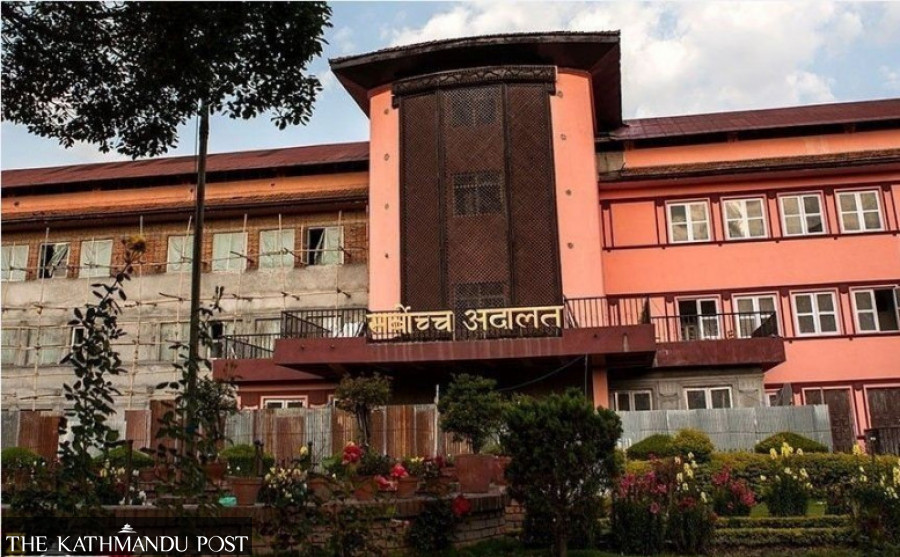National
Court puts brakes on arbitrary hirings at public entities
Order came in response to a petition challenging the appointment of an SLC graduate in Nepal Oil Corporation board.
Tika R Pradhan
On Thursday a division bench of Supreme Court justices Ishwar Prasad Khatiwada and Nahakul Subedi issued a landmark verdict to stop the ongoing haphazard political appointments in public enterprises.
The court issued the verdict along with a directive order in response to a petition by Advocate Jaya Prasad Paudel on behalf of the Forum for Protection of Consumer Rights Nepal. The petitioner had demanded that the appointment in January of Sahadev Bogati as an expert member to the Nepal Oil Corporation be quashed.
To facilitate Bogati’s appointment to the post, the government had amended the corporation’s related rules, which required that such a candidate must have passed the intermediate level and possess a few years of relevant experience.
Sahadev Bogati is an SLC graduate and by his own admission, is close to the then supplies minister Lekhraj Bhatta.
“Actually I was appointed in line with the rules,” Bogati told the Post. “I have been unjustly targeted after I refused to endorse some of the plans of the Nepal Oil Corporation Board of Directors and their budget.” But he refused to divulge the plans, which he said were against public welfare.
The then supplies minister Bhatta had appointed Bogati, a resident of Bajura, on January 24 after amending the corporation’s directives a few months earlier.
There are various instances where politicians have appointed their supporters and party cadres to the boards of various public entities by bending the rules.
Thursday’s Supreme Court order has quashed Bogati’s appointment and instructed public enterprises to do the needful to ensure that their office bearers have at least a bachelor’s degree and ten years of experience in the related fields.
“Nominations and appointments of individuals without the required educational qualifications to top positions will not contribute to the smooth operation and management of public enterprises,” the court has observed. “With such appointments, the objective of the law to ensure good governance cannot be achieved.”
In Nepal, especially after the restoration of democracy in 1990, most of the public enterprises have been rendered “recruitment centres” for political cadres, most of whom are unqualified to hold the positions they have been appointed to. Sajha Yatayat and Nepal Trolley Bus Service can be taken as examples of how haphazard political appointments can lead to the demise of public corporations.
The court has stated that the trend of making arbitrary appointments and nominations in various positions in public enterprises must stop and the enterprises should work out strict criteria to ensure that only qualified individuals are appointed.
A senior official of the Nepal Oil Corporation welcomed the verdict as much needed to make Nepal’s public enterprises responsible and efficient.
“Such verdicts could put the brakes on arbitrary appointments by political parties and ministers,” said the officer, requesting anonymity. “If qualified and efficient individuals are appointed to the board, the corporation can perform better.”
The writ petitioners welcomed the verdict saying it will help promote good governance and boost the efficiency of public enterprises.
“The court’s verdict will certainly discourage political parties from installing their unqualified henchmen in the helm of public entities,” said Paudel, an advocate who had filed the writ petition. “Now, political backing will not be enough to land top positions in public enterprises as one must be at least a university graduate with ten years of experience in the related field.”
Meanwhile, the chairman of the Forum of Protection of Consumers Rights Nepal Jyoti Baniya said his forum would pressure the public enterprises to draft necessary laws as directed by the Supreme Court.
“They should not be allowed to appoint people just on the basis of political recommendations. All public appointments should be based on merit, through open competition and in a transparent manner,” said Baniya.
Former chief of the Commission for the Investigation of the Abuse of Authority Surya Nath Upadhyay said such court orders, if implemented honestly, can make a big difference in how the public entities are run.
“The government should come up with a foolproof method to prevent politicians from turning political entities into recruitment centres,” Upadhyay told the Post.




 27.41°C Kathmandu
27.41°C Kathmandu














